Alex Goode has been in Japan for a matter of days struggling with the vagaries of quarantining in a foreign country in this most peculiar of years. He is ensconced in Abiko, a city similar in size to St Albans. It is on the outskirts of Tokyo, a metropolis of more than 20million people, where, in time, he will run out for the NEC Green Rockets in the Top League.
Never have the creature comforts of the Old Albanians clubhouse felt further away for a player who has spent his entire career cosseted in the bosom of the Saracens family.
It hasn’t gone too badly to date; five Premiership Rugby titles, four European Cups and 21 caps for England, where he became a cause célèbre for Eddie Jones’ selectorial stubbornness.
The move was, in truth, necessitated by the salary-cap scandal that engulfed the club, putting on pause the full-back’s 302 appearances for the north London side.
It will be a big difference from taking the field with eight or nine British & Irish Lions to finding the No9 has to dash off to his desk job as head of HR at 2pm.
Chatting to Goode, he explained that the opportunity to taste life in the Far East came about through Richard Graham, his assistant coach at Saracens in his formative years. Currently residing in the same apartment block as Graham, Goode will also have Andrew Kellaway, the former Northampton Saints and Rebels wing, plus Bristol’s former back-row Jack Lam for company but, apart from that that, he’ll be on his own, making new acquaintances until May, when he returns to conclude another two years of his contract at Saracens, by which time he’ll be 35.
Having done his due diligence, Goode is looking forward to experiencing a new culture. “NEC aren’t fully professional but they want to take the next step. It will be a big difference from taking the field with eight or nine British & Irish Lions to finding the No9 has to dash off to his desk job as head of HR at 2pm,” he said. “There is no comparing it, which is a good thing, allowing me to enjoy it without any pressure.”
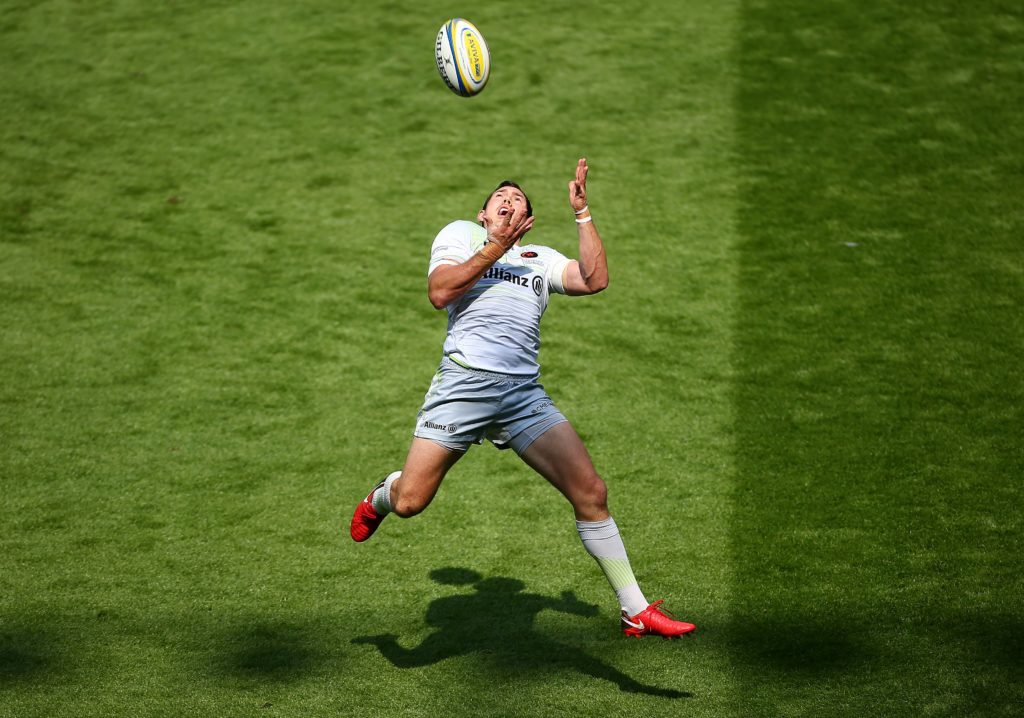
Unbeknownst to many, however, the last month of Goode’s career was as challenging as any he has experienced. Off the field, he was beside himself with worry about the health of his partner, Lucy, and trying to concentrate on two of Saracens’ biggest games of the year.
“Lucy is recuperating from a serious operation. We don’t know all the details yet but it’s likely that she’ll have another 12 weeks of treatment, so it’s something we’ll have to manage,” said Goode. “I don’t know if Lucy will be able to come out at any stage, but at the moment she can’t, so it’s tough not being there for her.”
I didn’t want to tell any players or coaches because I didn’t want them to worry or have a doubt my performance. I didn’t want them to feel like they had to tread on eggshells around me.
As a backdrop to the Leinster and Racing 92 Champions Cup games, Goode admitted masking his personal anguish became routine. “It’s amazing how good humans can be at acting. The week before Leinster was the hardest week of my life, by a mile,” he said.
“Picking Lucy up from A&E before training and having to miss weights because I hadn’t got home until 3am was not the norm. I didn’t want to tell any players or coaches because I didn’t want them to worry or have a doubt over my performance. I didn’t want them to feel like they had to tread on eggshells around me and it allowed me to just think focus on the game when at the club.”
Also playing on his mind was the fact he hadn’t played much rugby for a year after pectoral, quad and calf injuries. “When Owen Farrell got sent off (against Wasps), I thought, ‘I don’t need this’. I want to just focus on playing at No15 because I’m thinking, ‘I have enough on my plate and I don’t even know if I am going to go to Japan!’” said Goode.
“I wasn’t sleeping well. I was distant from my friends because I was trying to keep a lid on what was happening at home.”
The difficulty for Goode was that playing in the team’s key position meant hiding away was nigh-on impossible. “The problem with playing No10 is every coach wants something from you,” he said. “They want to know about the attack, the leadership stuff, the backfield because I’m not there, the kick-offs, this play, that play. It’s all-consuming.”
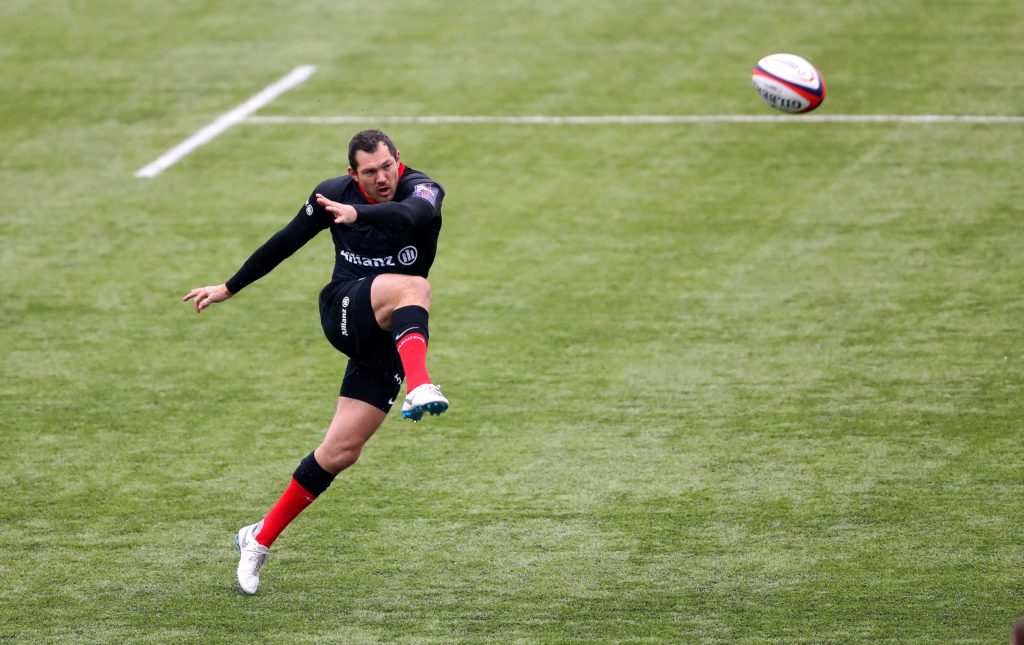
After weeks of worry where he hadn’t trained brilliantly, Goode was up at 4am on the morning of the Leinster quarter-final fretting. “I get nervous before games, which I like, but this was a different level,” he said. “It was my 301st game for Saracens but felt like my first. The night before we had a really honest chat as a player group and it laid the platform for the game, with a lot of emotion being shown by senior players.”
After an error-free first half, Goode had crossed the whitewash and executed Saracens’ game plan perfectly. “Someone said to me, ‘I really sensed that emotion when you scored’, but if you looked at it I went mad for a few seconds but then I crawled out the side of the celebrations stony-faced, gumshield in my socks, thinking, ‘I have to nail this conversion now’. It was like, ‘Next job, next job’,” he said.
“The way Leinster play, we had to be at our physical peak. They are used to steamrolling but they must have gone in at the break and thought, ‘How are we 22-3 down?’”
I think Owen’s misunderstood by people who don’t realise he is a deep thinker. That’s his nature.
Alex Goode on Owen Farrell
When it finished 25-17, Goode says he was enveloped by a sense of huge pride: “I knew people had written us off but the overriding emotion was relief. I was mentally spent but thinking, ‘I’ve got to do it all again next week’. The club doctor, who knew what I’d been through, turned to me and said, ‘Are you OK? That was some resilience you have shown this week, I take my hat off to you’.”
At that point, with Racing 92 up next in the semi-final, Goode said the camp felt they had a chance. “We thought about how so much had been taken away from us but this was in our control,” he said. “I knew seven or eight players had gone on loan and, yes, people had left, but there was a core group that made me think, ‘We can do this’. I looked around and saw Maro Itoje, Mako Vunipola, Jamie George, Vincent Koch, Brad Barritt, Michael Rhodes, Elliot Daly. All seasoned internationals.”
Throughout the final days with Saracens, Goode said Owen Farrell’s selflessness shone through: “Perhaps he doesn’t help himself in the press sometimes but I think Owen’s misunderstood by people who don’t realise he is a deep thinker. That’s his nature. The week leading up to Leinster, I said, ‘Let’s kick a few balls’, so the two of us went out there and did a few drills. It was unbelievably helpful. At the Aviva, the day before the game, he said, ‘Today has no bearing on tomorrow, just kick some balls and get a good feeling’. It took such a weight off my shoulders.”
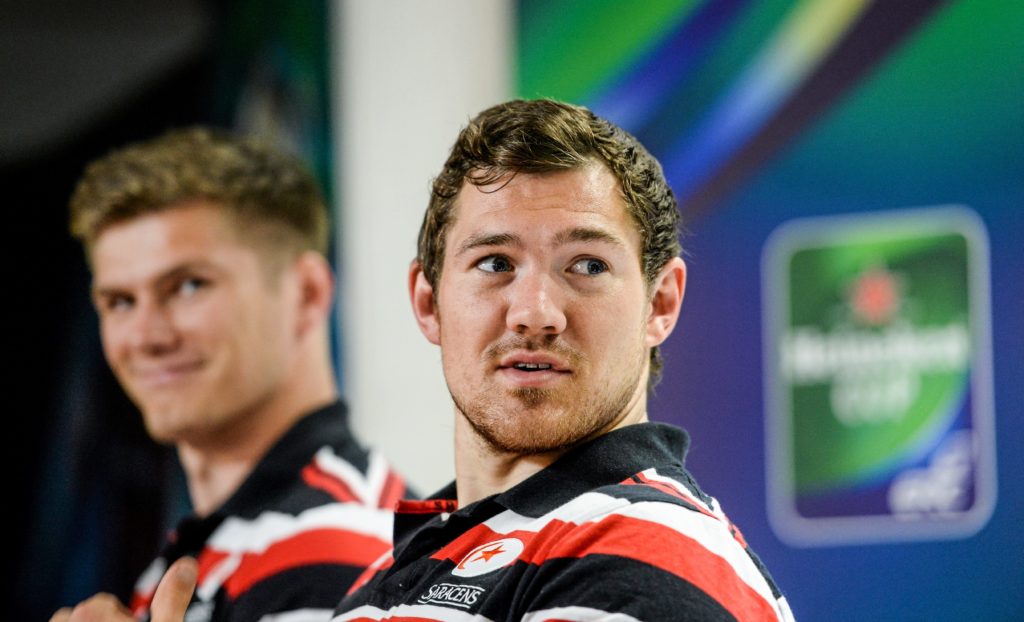
Before the Racing match, being a bit of a worrier, Goode was concerned that the kicking tee sat up on artificial pitches, so wanted to take some height off it, but he couldn’t get hold of the kicking coach. “Somehow we found a Stanley knife before lunch and Owen said, ‘I’ll do it’. So he sits there for 45 minutes, chipping away, nearly cutting his fingers up, and he’s like, ‘Is this all right?’ Here’s the England captain beavering away for someone else and he wasn’t fussed at all – I didn’t even use it in the end,” says Goode with a smile.
Launching into a stern defence of his team-mate, Goode says he cannot understand the opprobrium that comes his way: “There’s so much stuff written about him being a dirty player. Ultimately, he knew he’d done wrong. He’s not denying that. When he plays for England, most people want to laud him but there are certain parts of the media and fanbase who want him to fail. You could see people were annoyed he wasn’t banned for England’s autumn games, ‘Why isn’t it a longer ban?’ I’m thinking, ‘Don’t you even want him to play for England?’ It’s crazy.”
Fast-forward to Paris and after a cagey first half, Goode said there was still confidence they could get the job done: “After the break, we got some really good phase play going. Bang, we got a penalty. Bang, we got another one. We started to find our feet a bit but we didn’t take our chances from Alex Lewington or Dom Morris. We needed to be more clinical because a team like Racing are always going to have a moment and in the 76th minute they punished us.”
If you think of the team we’ll have the season after next, it has unbelievable potential. We will have the loanees back, the youngsters will be better and the 2008 graduates who came through will be 29-31 years old.
Alex Goode feels Saracens can go again
This time, a Harry Houdini act escaped them and it stayed 19-15 to the Parisians. At the final whistle, Goode says the overriding emotion was sadness. “It wasn’t tears, but it was so downbeat. We’d given so much and hadn’t quite got there,” he said. “In the ensuing days, it was difficult to pick ourselves up because it was hard to give the boys a proper send-off. There was so much emotion around.”
But, having had time to reflect, Goode believes the club will go again. “If you think of the team we’ll have the season after next, it has unbelievable potential,” he said. “We will have the loanees back, the youngsters will be better and the 2008 graduates who came through will be 29-31 years old.”
As he has got older, Goode says he has become more circumspect about the highs and lows of professional rugby: “When you’re young, you think you’re never going to have these days again. I remember we lost against Leicester in the 2009-10 Premiership final and I’d never been so low before in my life. My mates were leaving the club, it was horrendous. Ten years on, you appreciate those days even more because you realise the journey’s not over. Over time, you become more philosophical, more mature.”
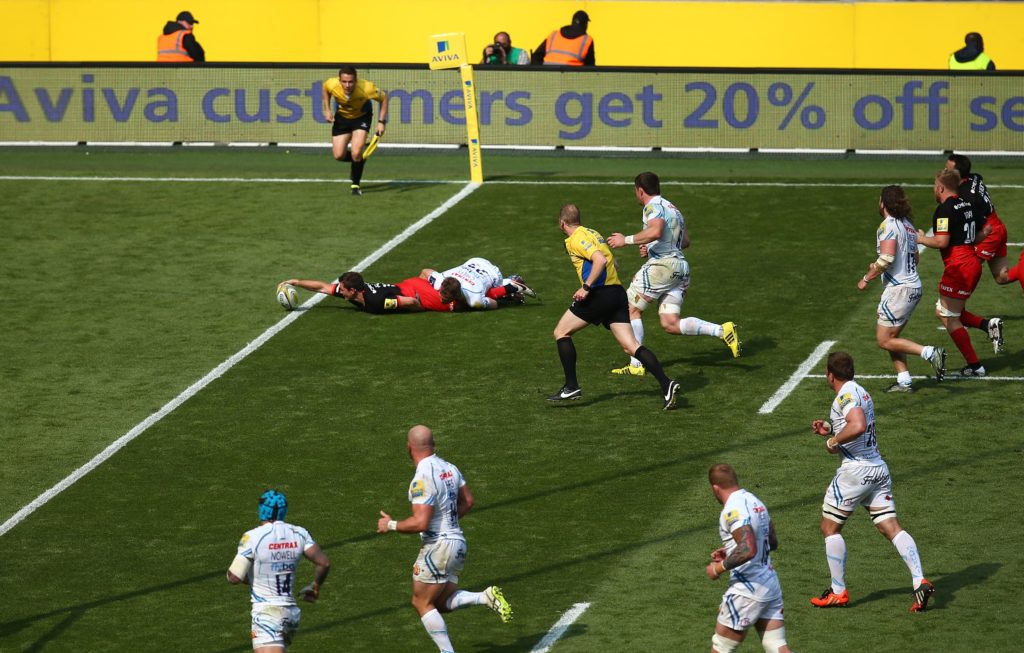
Goode opines, however, that he has mapped out his successful career by proving a point. “You hear some things that have been written about me, ‘Oh, he’s never played well in an England shirt’ but I’m like, ‘Player of the Series in the autumn’, ‘I was man of the match against Ireland’. I don’t want to sound bitter, because I’m not, but motivation does help,” he said.
“When Owen was banned, ‘Flats’ [David Flatman] put something up on Twitter saying, ‘Can Saracens win without Owen Farrell?’ I looked at it and 99 per cent were saying, ‘No. No. No’. I’m stroking my chin thinking, ‘Well, I’m not Owen Farrell but I wouldn’t write them off just yet’. That probably stuck in my mind.”
After being caught on social media enjoying an extended refuelling session after the 2019 Premiership final, it gave the impression that Goode didn’t lead the monastic, teetotal life of many young professionals and held on to old-school values. It made him popular to rugby fans of all creeds. “It’s probably helped by me going on the piss for a few days in my kit – so it turns out that everyone in rugby loves an ‘alky’,” he says with a laugh.
Some of my most cherished trips were to Verbier or the Munich Beer Festival with the boys. You get to know people, their motivations, their fears. It helps on the field when you’re up against it.
“Seriously, people who know me know how professional I am. You can’t play 300 games for Saracens if you’re messing about and have no work ethic. I pride myself on being one of the fittest players in the club but there is no better feeling than being out with my mates at the pub, bonding. Some of my most cherished trips were to Verbier or the Munich Beer Festival with the boys. You get to know people, their motivations, their fears. It helps on the field when you’re up against it.”
Reminiscing about the old days when the first team would beat up the academy boys until they toed the line, Goode says he was brought up with some terrible role models. “When I first came to Saracens at 18, we were cliquey, selfish and underperformed on the field. We’d have the odd cup run but we’d pick and choose games to perform in. Some people would live in north London, some in London Colney, some in Hatfield and some in St Albans. There was no team ethos. At the time, I thought it was like that at all rugby clubs but when Brendan Venter came in in 2009, it all changed. I thought, ‘Hold on, there’s more to it’,” he said.
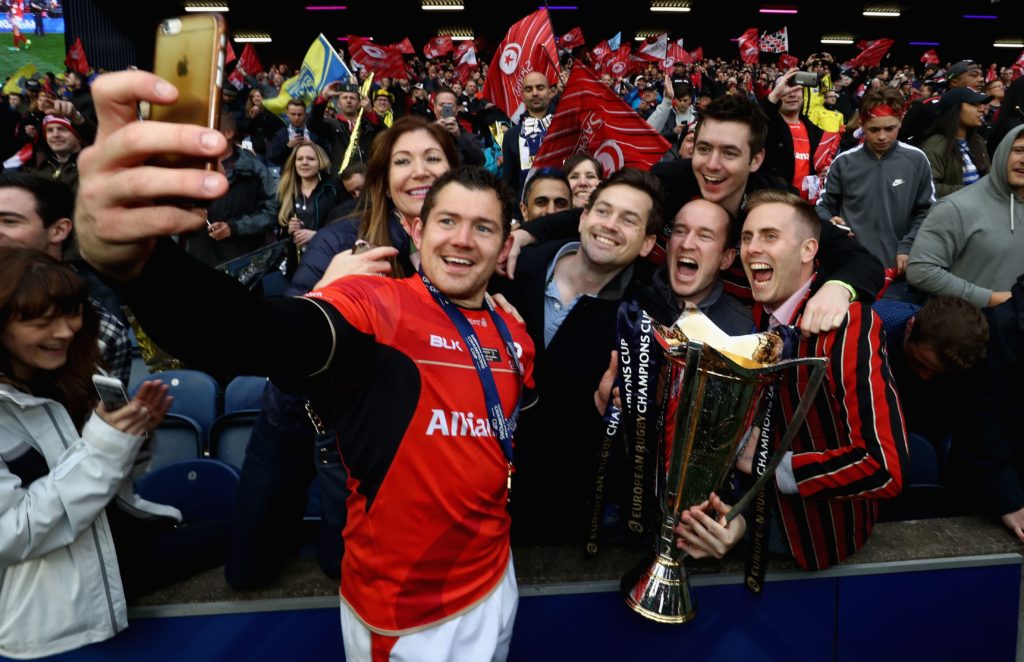
With Venter on board, Goode took on the responsibilities of a club man and unearthed the desire to give back to the sport that has given him so much, joining the Matt Hampson Foundation. Goode said: “I’ve always been a big supporter of ‘Hambo’. He’s one of our own and had an horrendous injury. I can’t believe how positive he is after getting dealt a hand like that. I can’t say, hand on heart, I’d be like he is. He’s accepting that’s his life. He’s supporting and raising funds to help people in a vulnerable situation. That, to me, is a genuine hero. He is a wonderful human being.”
Warming to his theme, Goode finds it frustrating when rugby players pass up the opportunity to go to a charity dinner. “You get to sit on a table for two or three hours and chat to people from all walks of life and are interested in us. A car is laid on for you and yet a lot of players just say, ‘Nah, not for me’. I get stick, ‘Oh, what you getting out of it? Some cash, eh?’ And I don’t rise to it. I think, ‘You pricks, it’s for charity. You can’t even give a few hours of your day’. What are they going to do? Watch Netflix at home or go on the PlayStation.”
When I was with England, I should have been more forceful about how I wanted to play to get the best from people around me, but I didn’t want to upset the apple cart… I wish I’d had more swagger.
A gifted sportsman as a callow youth, he was on the books with Ipswich Town and represented his county in tennis and athletics, so you wonder if Goode has always had the inner confidence that comes with such prodigious talent. Has it given him outwardly, at least, an insouciant air? “It may look like it but my biggest regret is that I haven’t backed myself enough,” he said.
“When I was with England, I should have been more forceful about how I wanted to play to get the best from people around me, but I didn’t want to upset the apple cart. I’ve watched Willie Le Roux for a long time and he’s a brilliant player, but I’m in awe of the confidence he has to push the fly-half out of the way and say, ‘Give me the ball, I’m doing this’. That is something I’ve never had. I wish I’d more swagger.”
The Saracens players knew him well enough to know Goode preferred making space for others, but England was always different. “In camp, everyone wants to showcase what they can do. Sometimes there were centres in camp who weren’t really great at finding space, but they wanted to show they were a ball players – I thought, ‘This is a nightmare’ but I can’t go, ‘Look, you’re rubbish at this, let me do this, I’ll make you look good’ because that’s an arrogant, forceful thing to do.”
Despite the navel-gazing, Goode believes he has deserved to be out on the grandest stage, playing for Saracens and England, but has come to understand his genetic make-up better: “As you get older, you reflect and analyse your parents. They’re both worriers.
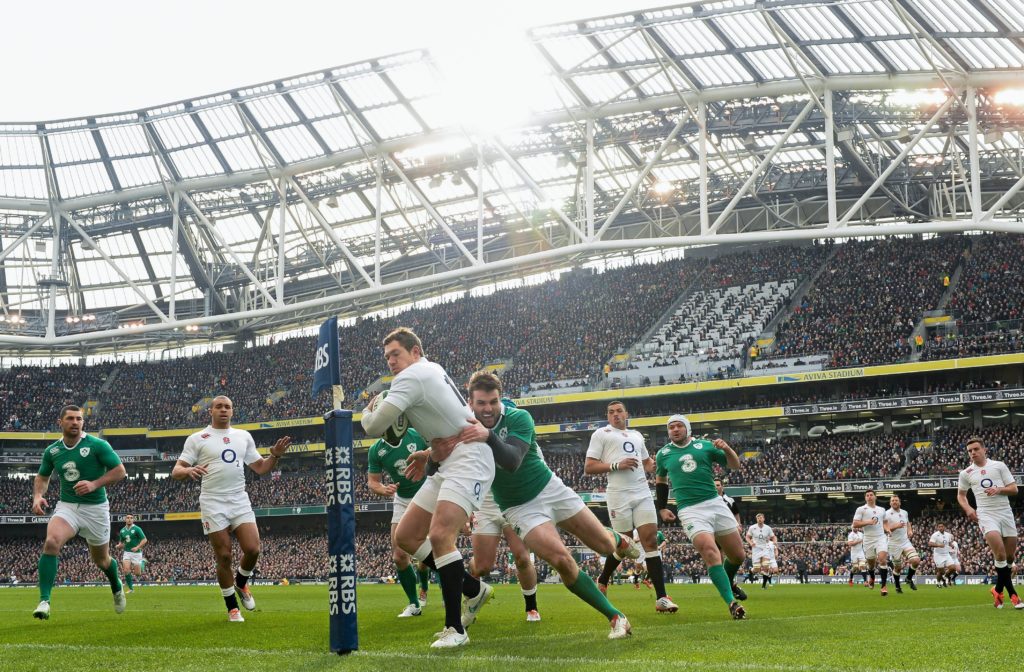
“I’ll give you a funny example: My dad phoned me before the Leinster game and said, ‘Are you kicking this week? Better get some practise in’, and I’m like, ‘No shit, Sherlock’. So he leaves it a few days and just before I head for Dublin he phones me again and says, ‘I’ve been thinking… Sometimes when you play golf, you’ve got water on your right and you don’t want to fan it so you snap hook it to the left’. I’ve put the phone away from my ear, and he’s like, ‘You got that?’ I’m thinking, ‘You have no idea how nervous I am and now you’re putting your worry on to me about shanking my kicks’. I love him to bits and he means well but I had to say, ‘Dad, I love talking rugby with you but don’t project your worry’. He says, ‘I wasn’t worried’. I’m like, ‘Yeah, okay then’.
For the next six months, Goode will watch Saracens from afar and he is strident in his defence of the club. “I’m not going to stand here and tell you the club were well run because clearly they weren’t but the narrative that we’re only successful because of the money doesn’t wash,” he said.
“The Irish have had more money than us over the years; the French have had way more money. There has to be something else ingrained; it’s our culture. We’re a team willing to work and fight for each other. To do that year-in, year-out is bloody hard.”
While in Japan, Goode will also have time to assess how the game he loves rides out its current storm. He says it’s time for honesty and longer-term thinking: “Rugby suffers from a huge amount of short-termism. Everyone looks at it from their point of view and not what’s beneficial for the game in the longer term.
“Never has that been more apparent than with the CVC money. All clubs received £13m last year, and now people are saying, ‘Oh, we’re bankrupt if there’s no crowds?’ I mean, where’s it gone? The reality is they get the money and they don’t think, ‘Let’s put the money into infrastructure, a buffer for a rainy day’, they think, ‘Let’s spend it on more players’. The owners are amazing and give so much to players – we are very lucky – but clubs need to be run better.”
An intelligent thinker off the pitch and graceful player on it, the sport should be counting down the days it takes Goode to start gracing the English game once again. A class act and one rugby should treasure.
If you’ve enjoyed this article, please share it with friends or on social media. We rely solely on new subscribers to fund high-quality journalism and appreciate you sharing this so we can continue to grow, produce more quality content and support our writers.


Comments
Join free and tell us what you really think!
Sign up for free